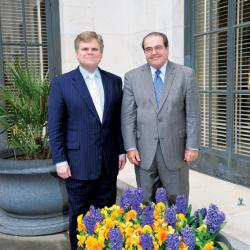In June, when the Supreme Court upheld President Obama’s health care reform, Chief Justice John Roberts’ opinion declared that the individual mandate’s “minimum coverage provision” shall not be considered a penalty, as the law itself says, but rather a tax, “because it functions like a tax.” The court’s dissent, one joined by Justice Antonin Scalia, argued that this decision “suggests the existence of a creature never hitherto seen.” Let’s call that monstrous and mythical creature Penalty That Is Also Tax. Because the legislation contains the word “penalty” and because words mean what words mean, the dissent insists on a reading that sees dictionary definitions of “tax” and “penalty” as mutually exclusive. Given the scope and significance of the new law, this may be some indication of how significant certain dictionaries weirdly still are.
Now, exactly how—and how often—judges use the dictionary depends partly on their philosophies of interpretation. The dissent, for instance, relies on an approach known as “textualism,” the subject of a new book by Justice Scalia, Reading Law: The Interpretation of Legal Texts. This is a second he’s written with the lawyer Bryan A. Garner, most well known, until now, for his 1998 A Dictionary of Modern American Usage, the one dictionary I still keep in the house. Garner was so decent and sensitive and fair in that dictionary it’s been called a work of genius—called that by a genius, no less. (More on the genius in question later.) Erudite and comprehensive though the new book may be, I can’t really say the same for Reading Law.
Through a series of 70 short essays, Reading Law details how authority—here, the rule of law—is established and ought to be maintained in our democracy. It takes particular aim at “crabbed” legal language, so called, in part, for the way it construes meaning unpredictably, say sideways or backward. Case in point: By deciding the Obamacare penalty was actually a tax, Roberts moved unpredictably. (Or, Roberts invoked the “Constitutional-Doubt Canon,” which Reading Law defines this way: “A statute should be interpreted in a way that avoids placing its constitutionality in doubt.”)
Scalia and Garner’s approach offers legal documents what they call a “fair reading,” or
the interpretation that would be given to a text by a reasonable reader, fully competent in the language, who seeks to understand what the text meant at its adoption, and who considers the purpose of the text but who derives purpose from the words actually used.
Textualism means to remedy what conservatives often call “judicial activism” or what Scalia and Garner see in the “adventurism” behind a ruling such as Roe v. Wade, where “the Supreme Court declared unconstitutional state statutes that in no way contradicted any specific provision of the Constitution.” A fair reading would have returned a different result—one worthy, they might say, of our democracy.
For Scalia and Garner, textualism is the great judicial defense of America’s system of lawmaking and checks and balances. It goes like this: Elected by voters and working together as a body, our legislators bring together lots of individual intentions, which means that drafting laws requires compromise. It’s absurd, then, to think there might be a singular “legislative intent” behind any statute. The same goes for readings of the “spirit of the law” instead of its “letter” or a belief in the “Living Constitution.” Absurdities all. When judges do anything but fairly read texts they turn the whole Constitutional system on its head.
The reason Bryan Garner’s name may sound familiar (and perhaps also the reason the new book exists at all) probably has less to do with his views on the Constitution than with an admiring 2001 review of his usage dictionary written by David Foster Wallace. That review does a number of wonderful things, but it’s most remembered for Wallace’s taking a moment “to establish and define the highly colloquial term SNOOT,” which is exactly what it sounds like, “a really extreme usage fanatic.” Garner is a SNOOT of the first class. So is Scalia. And so was Wallace. Garner, who’s very active on Twitter and considered himself a good friend of Wallace, started a hashtag last December in his memory: #yourenosnoot. His first memorial tweet:
SNOOTs, also known as prescriptivists, typically approach usage questions by insisting that, within reason, language shall follow particular rules (e.g., “Don’t Dangle Your Participles” or “Ain’t Ain’t A Word”). On the other side of our American conversation about usage are descriptivists, who insist that language may properly be used in any number of ways. Ever hear someone say ain’t? Yes? Ain’t is so a word. (So’s irregardless.)
Writing courses I teach all begin with a discussion of Wallace’s essay, “Tense Present,” and two of its key terms: Standard Written English and the Democratic Spirit, “one that combines rigor and humility, i.e., passionate conviction plus sedulous respect for the convictions of others.” I also highlight Wallace’s argument about the “very weird and complicated relationship between Authority and Democracy in what we as a culture have decided is English,” a relationship that makes instructing people in Standard Written English equally weird and complicated. Given both its utility and also the basic unfairness behind the fact that Standard Written English is “an instrument of political power and class division and racial discrimination and all manner of social inequity,” as Wallace says, how one makes a “pro-SWE argument” is always just as important as the points of usage one’s arguing for. (It’s OK to end a sentence with a preposition.) Wallace, for one, admits to having problems always being particularly well-reasoned or calm; at one point he declares a descriptivist’s claim “so stupid it practically drools.” In his Dictionary, though, Garner has been rigorous and humble in a way that makes you both trust and like him. Seeing this, Wallace discovers something more—namely, Garner’s genius.
A Dictionary of Modern American Usage was made with a Democratic Spirit. Wallace says it “Wants Your Vote.” Without ever making claims for himself beyond a passion for the language and willingness to make judgments, Garner possesses a genius that originates in the awareness that he must constantly be making the case “with clear, logical reasoning that’s always informed by the larger consensual purposes SWE is meant to serve.” Making this possible is the persona Garner assumes, which Wallace eventually identifies as “objective, but with a little o, as in ‘disinterested,’ ‘reasonable.’ ” And what’s more, it’s never clear to Wallace whether Garner is “black or white, gay or straight, Democrat or Dittohead.”
In Reading Law, itself a kind of “pro-SWE argument,” Garner assumes a different persona that’s at once clearer and more opaque. Whereas Scalia describes himself as “a confessed law-and-order social conservative,” Garner now acknowledges that “he is pro-choice … and supports same-sex marriage; but he finds nothing in the text of the Constitution that mandates these policies.” And yet, when they write with one voice, the persona seems to attach itself to Garner’s more well-known co-author, who by reputation and by virtue of his office Couldn’t Care Less About Your Vote.
Consider, just for instance, what Scalia and Garner together have to say about a New York case (Braschi v. Stahl Associates Co.) concerning a statute that prohibited a landlord, after a tenant died, from evicting a spouse or “some other member of the deceased tenant’s family” who’d been sharing the home:
Did this include a cohabitating nonrelative who had an emotional commitment to the deceased tenant? Yes, said the court, relying on secondary dictionary definitions in which family is defined figuratively, not literally. The dissent correctly criticized this expansive interpretation, confining family to its traditional sense of “objectively verifiable relationships based on blood, marriage, and adoption, as the State has historically done in estate succession laws, family court acts and similar legislation.”
Garner and Scalia don’t provide some relevant details here, though they may disagree with me, and perhaps each other, about their relevance. The “cohabitating nonrelatives” in question were two men, Miguel Braschi and Leslie Blanchard, who’d been living together from 1975 to 1986, when Blanchard died of AIDS. The men considered themselves relatives—indeed, spouses, as did their families—in a time before same-sex marriage was recognized in New York state (or any other state, for that matter).

Photo courtesy of Mattox Photography.
Omitting these facts may have no bearing on a textualist reading of the statute. But euphemizing “gay domestic partner” or “life partner” or even “common-law husband” with the roundabout and clumsy “cohabitating nonrelative who had an emotional commitment” makes the authors seem squeamish as a Dittohead and, well, perhaps also a little embarrassed—no longer so proud of what textualism would have them say about interpreting statutes or the actual fairness of our democracy fairly read.
This democracy, according to Garner and Scalia, must work as it originally worked, which means we must continue to put certain rights of certain people up to popular vote. But it seems to me, a nonlawyer but something of a SNOOT, that in the case of Miguel Braschi, the fairest reading of family should include his partner of 11 years. Garner and Scalia may call me a crab, but I’m certain the word family has had all kinds of traditional meanings beyond (1a) “objectively verifiable relationships based on blood, marriage, and adoption.” (Certainly, no good law-and-order social conservative Catholic would deny the Holy Family was a family, uncertain paternity notwithstanding.) And while it’s true that much of the thoughtfulness about the utility of language we find in Garner’s dictionary can be found in Reading Law, I’m not convinced it’s the work of a democratic genius. Writing with Scalia, Garner no longer wants your vote.
As the book approaches the end, the authors double down on textualism’s unique ability to protect our democracy; their approach, they say, should work especially well in controversial situations. Yet it hasn’t always—remember what they had to say about Roe v. Wade. And in Reading Law, the authors conclude by lamenting the nontextualist adventurism that has resulted in a republic where “abortion and homosexual sodomy, which society so much disapproved that they were criminal under the laws of most states and had been for centuries, are now constitutionally protected.”
The reading of the Constitution that’s led us here seems mainly informed by the larger consensual purposes the document is meant to serve. This is where the Democratic Spirit has brought the nation. Dilige et quod vis fac. And yet, by Garner and Scalia’s account, the reading that has gotten us here is not simply crabbed. It’s worse than that. Because nontextualism has, for instance, made “abortion and homosexual sodomy … off-limits to the democratic process,” it’s also made the law less certain generally, which means we’re all less secure under its rule. This is what conservatives like Scalia always say. As for Garner, nowadays he might be a little pithier: If you interpret the Constitution to protect abortion and gay lovemaking, #yourenosnoot.
—
Reading Law: The Interpretation of Legal Texts by Antonin Scalia and Bryan A. Garner. Thomson/West.
See all the pieces in this month’s Slate Book Review.
Sign up for the Slate Book Review monthly newsletter.
